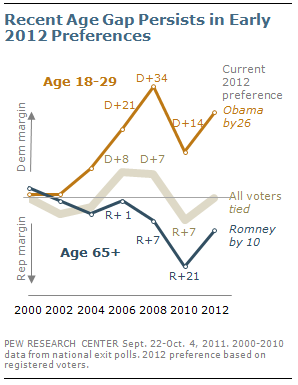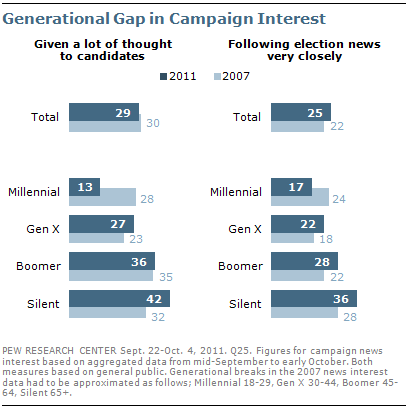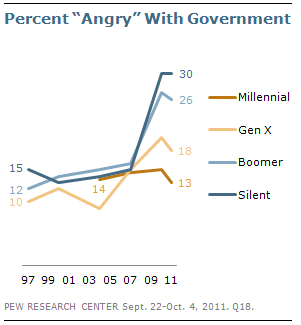WASHINGTON -- A massive new report released by the Pew Research Center has mixed news for President Barack Obama: The age gap in voting that opened up over the last seven years and helped elect him president in 2008 is persisting, but the political enthusiasm and engagement that younger voters demonstrated four years ago is "substantially depleted."
The declining economy has hit younger Americans hard, and Obama's approval ratings have declined as sharply with them as with other age groups. These trends have some speculating that Republicans might make a "significant dent" in Obama's share of younger voters, sometimes called Millennials or Generation Y.
Yet according to the Pew Research data released Thursday, Obama remains the overwhelming choice of younger voters when matched against Republican candidate Mitt Romney. Obama currently leads Romney among Millennial voters (ages 18 to 30) by a 61 to 37 percent margin. According to network exit polls, Obama's 2008 margin over Republican nominee John McCain among Millennials was larger (66 to 32 percent), but the president has lost ground across all age groups. The remarkable gap between the youngest and oldest voters' political preferences -- a relatively new phenomenon that first emerged in 2004 -- persists.

What has changed since 2008 among the youngest voters is their level of enthusiasm and engagement. "There has been a substantial decline in interest among Millennials," the Pew Research analysts report, "combined with a spike in interest among older voters." The number of Millennials who say they have given a lot of thought to the candidates has declined from 28 percent at this point in 2007 to 13 percent now. Similarly, the number paying close attention to the campaign has fallen from 24 to 17 percent since 2007. Those changes have created what Pew Research calls "a wide generational gap in attention to the campaign that was not present in 2007."

Digging deeper, the Pew analysts also find a "substantial partisan gap" on engagement and interest that interacts with the age gap. Republicans are generally following the campaign more closely now than four years ago, while Democrats are following it less closely. Thus, "it is the younger Democrats who are the most disengaged, while attention among the older Republicans has surged," Pew Research reports.
Why the drop in engagement among younger Democrats? Some of it may reflect the lack of a Democratic primary contest this year, which may mean the engagement gap will narrow later in the campaign. But the Pew analysts see "signs that the fundamental imperative to vote that Millennials felt in 2008 may be less intense in 2012," pointing to a 12 percentage-point drop since October 2007 (from 81 to 69 percent) in the number who say they care a good deal who wins the White House. No such decline is evident among older voters.
Michael Dimock, a Pew Research associate director, told The Huffington Post that opinions about Obama's performance explain some of the decline in enthusiasm among younger voters. "Obama hasn't brought about the kind of change that many Millennials were hoping for in the campaign," he said, "and so there's a certain disappointment with how things have turned out." Most are still likely to choose Obama over a Republican, but not with the same enthusiasm as in 2008.
Far more Millennials name Bill Clinton (48 percent) than Obama (14 percent) as the president who did the best job during their lifetimes, despite the fact that most were still children or teenagers when Clinton was president.
But Dimock added an important caveat: "A lot of the energy in 2008 was not due to Obama; it was due to George W. Bush." Youth turnout was relatively high in 2004 and 2006, and much of the interest and engagement measured by the Pew Research surveys occurred in late 2007 before Obama emerged as the frontrunner for the Democratic nomination.
"I think you have to remember that the context in '08 was so much about Bush and changing the nature of politics in this country," Dimock said. "Obama swooped in and picked up on that theme, and drew the support of a lot of those Millennials, but it wasn't necessarily him that brought them on board."

The generational gap in engagement emerges out of both waning interest in the young and rising interest among the older cohorts. The latter is related to a growing anger at government. The Pew report finds that, although trust in government has fallen across all age groups, the percentage who describe themselves as "angry" at government has spiked upward with older voters.
"In the last four national elections," the Pew analysts write, "generational differences have mattered more than they have in decades." The Pew data tells us that the gap between younger and older voters will likely matter again in 2012.

